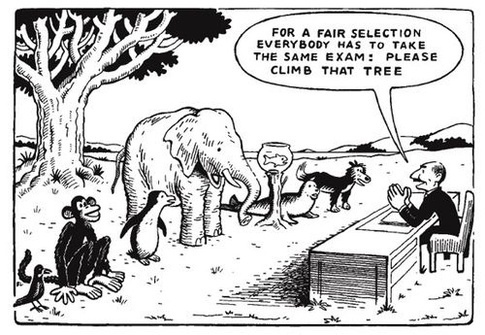
The Subjective Nature of Modern Intelligence by Sarah Tabibzada
We find ourselves here, in an AP classroom. We are the smart kids. We are the studiers, the thinkers, and the “leaders of tomorrow,” as the Board of Education likes to say. Isolated from the “regents kids,” we compete within our own faction of Whitman. And within our little faction, we find a series of sub-factions. Here, you will find both the apex students and the pseudo-academics.
Our Walt Whitman High School is a microcosm of academia. One might assume that this community, composed of such competent kids, would be an educated one. This is not the case.
Jean Piaget, a developmental psychologist, wrote, “The principle goal of education in the schools should be creating men and women who are capable of doing new things, not simply repeating what other generations have done.” This microcosm we find ourselves in struggles to create the thinkers or the “leaders” of tomorrow. Rather, school has merely created a myriad of copy machines. In this arena, the perception of intelligence is skewed. IQs are not tattooed on our foreheads yet our grades are scrawled on each page in our binders. I, for example, have entered 5,405 terms into Quizlet in the past few years. While memorization and storage and utilization of facts and statistics have their place, they are meant to only overlap with education. These grades we receive reflect mere memorizations.
To memorize is to commit to memory. To be educated is to be developed, cultured, and granted a broader view of our microcosm and, more importantly, our macrocosm. Irish poet William Butler Yeats declared that “Education is not the filling of the pail, but the lighting of a fire.” The natural curiosity students feel is squelched by the standardized-test-constricted curriculum. Numerous studies have shown that the driving force behind a desire to learn is creativity. Susan Engel explains that she “would suggest that curiosity is simply the urge to know more.”
Creativity is the momentum of education. Our schooling hampers creativity. Thus, our schooling thwarts our education.
Albert Einstein said that “Education is what remains after one has forgotten what one has learned in school.” Ignorance is lethal and it is often a noxious offense committed by the uneducated. We cannot start over for we are already eleven-twelfths of the way through our basic schooling. We can, however, begin to educate ourselves. We must be aware of the conversation around our dinner tables tonight. We must pick up one of the classics. We must read the headlines. And we must maintain an open mind in our macrocosm.